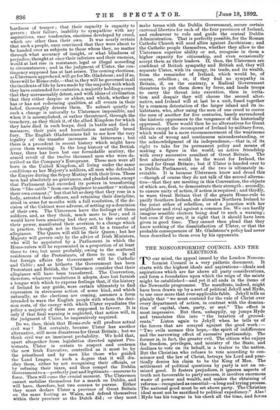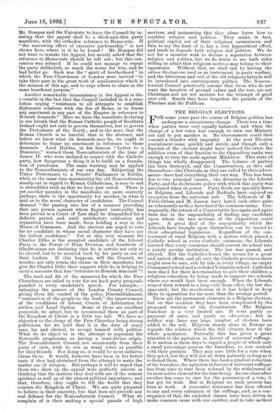THE NONCONFORMIST COUNCIL AND THE ELECTIONS.
TO our mind, the appeal issued by the London Noncon- formist Council is a very pathetic document. It starts with the highest ideals and aspirations—ideals and aspirations which are far above all party considerations, and form a foundation upon which the reign of the saints might be established—and yet it all ends in the items of the Newcastle programme. The manifesto, indeed, might have been drawn up by a sort of political Jekyll and Hyde, to use once more that ever-applicable fable. Jekyll tells us plainly that "we must contend for the rule of Christ over every department of action, in contrast with the domina- tion of capital, class, party, or sect." The effect is most impressive. But then, unhappily, up jumps Hyde and translates this into "the taxation of ground- rents." Listen again to Jekyll when he tells us of the forces that are arrayed against the good work :— " Two evils menace this hope,—the spirit of indifference and the narrowing effect of excessive partisanship. The former is, in fact, the greater evil. The citizen who enjoys the freedom, privileges, and ministry of the State, and declines to vote on its behalf, is a traitor to the nation. But the Christian who refuses to vote according to con- science and the law of Christ, betrays his Lord and prac- tically denies his claim to be the King of Men. The settlement of political questions by party is not an un- mixed good. It fosters prejudices, it ignores aspects of truth not favourable to party success, it involves enormous waste of power and wealth, and makes the obtaining of reforms—recognised as essential—a long and trying process. The national good must be set above party. The Christian ideal must not be sacrificed to political expediency." Alas ! Hyde has his tongue in his cheek all the time, and forces Mr. Bompas and the Unionists to leave the Council by in- sisting that the appeal shall ba a thick-and-thin party manifesto, with the orthodox reference to Home-rule. If "the narrowing effect of excessive partisanship" is not shown here, where is it to be found ? Mr. Bompas did not want to remake the Appeal, but merely asked that the reference to Home-rule should be left out ; but this con- cession was refused. If he could not manage to repeat the party shibboleth, so much the worse for him, and he had better go. Such was the "spirit of brotherhood" in which the Free Churchmen of London were invited "to take their part in the great work of amelioration which is the mission of this age, and to urge others to share in the same beneficent purpose."
Another remarkable inconsistency in the Appeal is dis- c werable in the fact that the Council included in it a reso- lution urging "resistance to all attempts to establish diplomatic relations with the See of Rome, or to frame any enactment in any part of the Empire in reference to Romish demands." Here we have the manifesto declaring in one breath that the Roman Catholic people of Southern Ireland ought not only to govern themselves, but to govern the Protestants of the North ; and in the next, that the Roman Church is so hateful, that in the abstract, and before we know what its demands may be, we ought to determine to frame no enactment in reference to those demands. Lord Halifax, in his famous "Letter to a Dissenter," warned those Nonconformists of the time of James II. who were inclined to coquet with the Catholic party, how dangerous a thing it is to build on a founda- tion of paradoxes. The same warning may be applied to the Nonconformists of our own day. Subjecting the Ulster Protestants to a Priests' Parliament in Dublin, while at the same time maintaining the old Nonconformist standpoint in regard to Roman Catholicism, is sure to end in absurdities such as that we have just noted. There is yet another paradox in the manifesto, or, more correctly perhaps, there is the opportunity for another, in what is said. as to the moral character of candidates. The Council demand "the passing into law of a measure providing that any person against whom flagrant immorality has been proved in a Court of Law shall be disqualified for a definite period, and until satisfactory confession and reparation have been made, from holding a seat in the House of Commons. And the electors are urged to vote for no candidate in whose moral character they have not the fullest confidence." Yet at this very moment Sir Charles Mike is the accepted candidate of the Liberal Party in the Forest of Dean Division, and hundreds of Gladstonians are declaring that he is certain not only to be elected, but to be received back by his party as one of their leaders. If this happens, will the Council, we wonder, not only retain the clause in their manifesto, but give Sir Charles Dilke their support while he is helping to carry a measure that has "reference to Romish demands "?
The rank and file of the measures for which the Free Churchmen are asked to vote for are hack party proposals paraded in every candidate's speech. For example,— enlarging the powers of the London County Council, giving them the control of the police, Disestablishment, "restoration of the people to the land," the improvement of the conditions of labour, Courts of Arbitration for strikes, and Local Option. Some of these are excellent proposals, we admit, but to recommend them as part of the Kingdom of Christ is a little too tall. We have no objection to the clergy of the Free Churches being strong politicians, for we hold that it is the duty of every man, lay and clerical, to occupy himself with politics. What we do object to is the attempt to represent the Newcastle programme as having a semi-divine origin. The Nonconformist Council, not unnaturally from their point of view, wish to win as many votes as possible for their friends. For doing so, it would be most unfair to blame them. It would, however, have been in far better taste if they had abstained from the attempt to make the matter one of religion. But perhaps it will be urged that those who drew up the appeal were perfectly sincere in thinking that the matters they deal with are of the utmost spiritual as well as of the utmost political importance, and that, therefore, they ought to tell the world that they concern the Kingdom of Christ. We are quite prepared to believe in their sincerity, but that does not provide any real defence for the Nonconformist Council. What we complain of is their making a special parade of high motives, and insinuating that they alone know how to combine religion and politics. They make, in fact, political capital out of their religious earnestness, and this, to say the least of it, has a very hypocritical effect,. and tends to degrade both religion and politics. We do. not for a moment wish to declare a separation between religion and politics, but we do desire to see both sides- willing to admit that religious motives may belong to their opponents. Without that, we shall end by having the odium theologicum used as an instrument in party warfare, and the bitterness and evil of the old religious hatreds will be introduced into contemporary politics. The Noncon- formist Council practically assume that those who do not want the taxation of ground values and the rest, are not Christians and are not anxious for the triumph of good over evil. Surely they have forgotten the parable of the Pharisee and the Publican.







































 Previous page
Previous page